Blogs
Displaying items by tag: keyboard
How to Setup an Affordable Home Recording & Podcast Studio
By now, I'm sure you've noticed that podcasting is a growing trend on social media.
With some good planning and a small budget, you too can get into the podcast and home recording studio game. Here are some tips on what you'll need to have a professional quality studio at home.
1. Computer
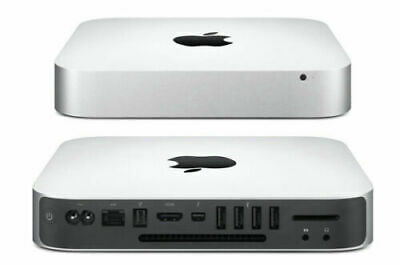
Avoid extra headaches and get yourself a Mac! I highly recommend the Mac Mini series for their compact size with a lot of punch! Make sure there's at least 8GB of memory configured. You can get away with 4GB, but you'll eventually run out of system resources slow your system down tremendously.
2. Audio Interface

It has been about a year that I have had my Zoom LiveTrak-8, and I must say I am very pleased and impressed with its capabilities and performance. It can run up to 1 ½ hours with just four AA batteries, or on a USB battery, so you can podcast from anywhere. It also has an SD card interface that allows you to record while you live stream. It works well with all my DAW software (Logic, FL Studio) and with Zoom, Google Meet or any other podcasting or streaming service.
3. Microphones

If you're just doing regular podcasting, you can get a good condenser microphone kit, such as the Audio Technica or Zoom podcast kits. Both come with a mic stand and headphones.

For recording your voice for music, you'd need a dynamic microphone with a stand. I picked up a Shure SV-100 with an On-Stage boom microphone stand.
Whichever microphone you get, make sure to get a pop filter which will make a difference in how certain hard sounds come out on audio.
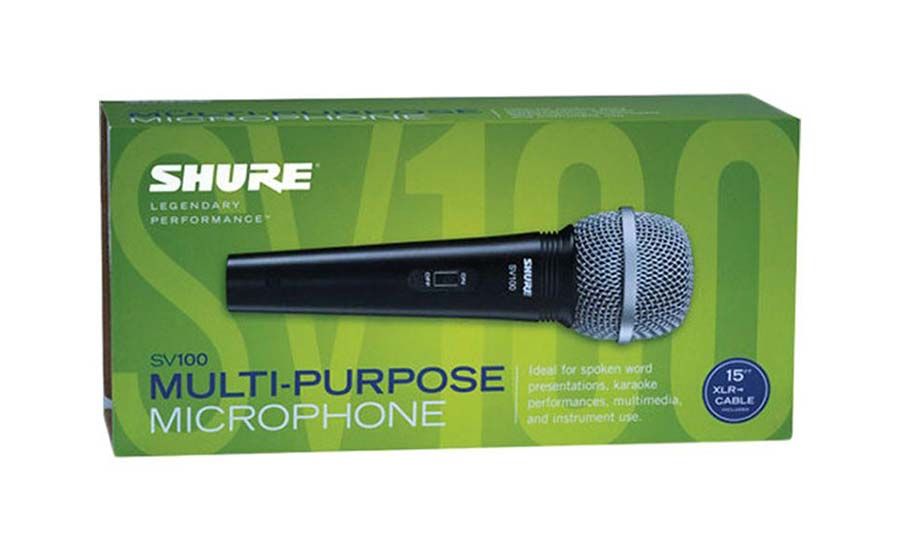
4. MIDI Keyboard
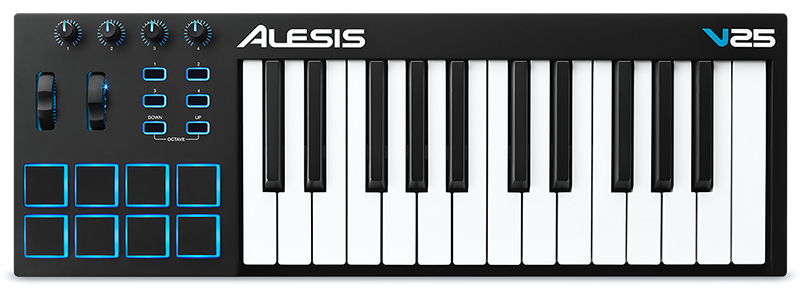
Since we're just starting out, there's no need to go out and get a large keyboard that will take up space in your room. The Alesis V25 has 25 keys (2 octaves), pads, and knobs that can be assigned to different sounds or functions in your favorite DAW.
5. Studio Monitors
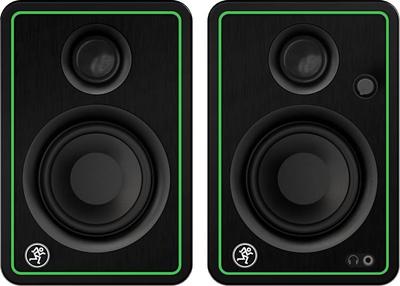
We're going to need speakers for your studio. One set I recommend is the Mackie CR-X multimedia monitor. They're not the fanciest, but the price for the quality ratio is acceptable.
Altogether, we're looking at a budget of under $3,000 for your home studio and podcast projects. It's money well worth investing in especially if we end up with more lockdowns. I know there are more rounds coming, and I wanted to be sure I had all I needed to keep my sanity while kept at bay!
6. Streaming Software
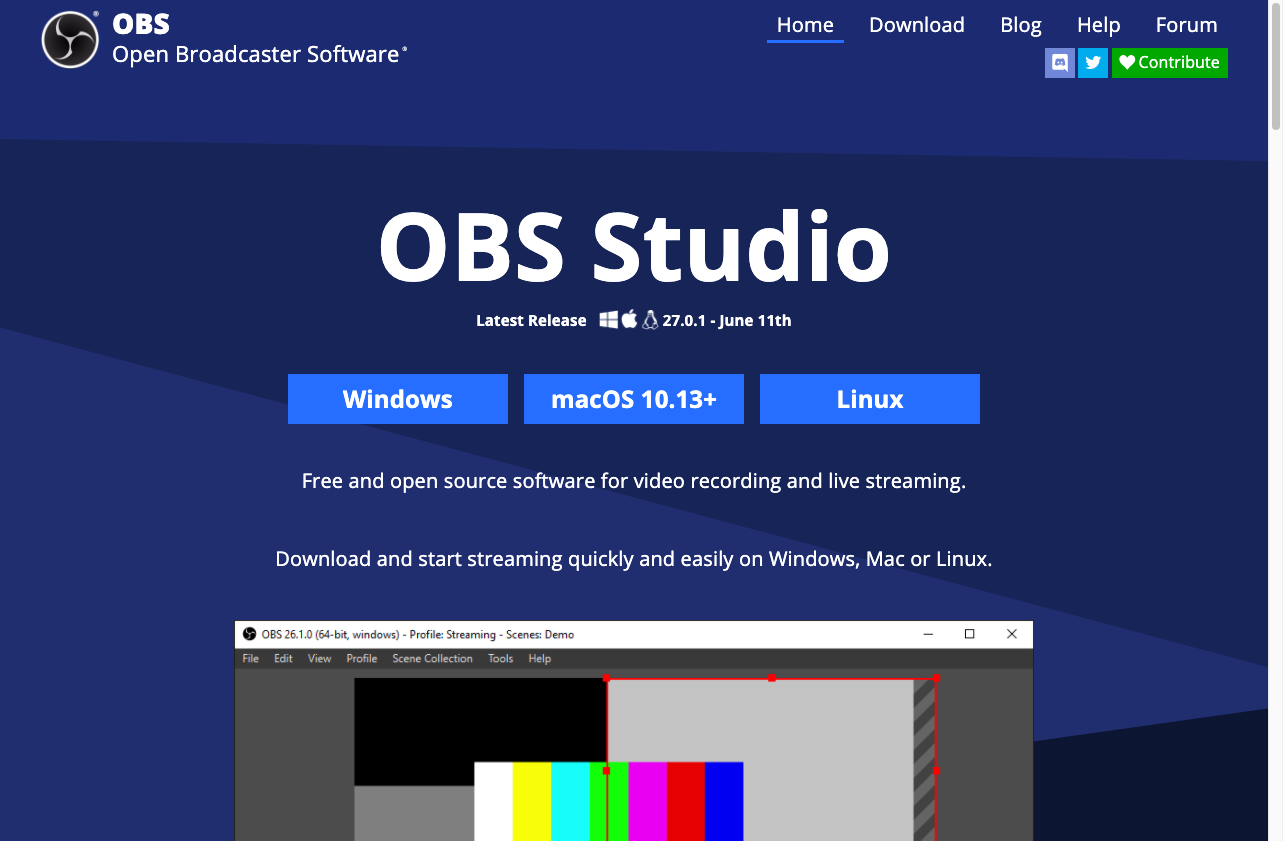
OBS Studio allows you to create scenes that give your visual broadcasts a more professional look and feel. You can also record your sessions to a hard drive for later editing. There is another version available from Streamlabs that has additional features. It really depends on what you plan to do with your podcasts that will determine which broadcast app to use. Sites like TikTok and Instagram do not allow for use of a streaming service for your feed. You won't have any issues with YouTube, Twitch, Facebook, and a few others.
Here's what my desktop studio looks like. Once you get your setup ready to go, please send me a pic! While you're at it, why not send me your blog page so I can subscribe, like and share!
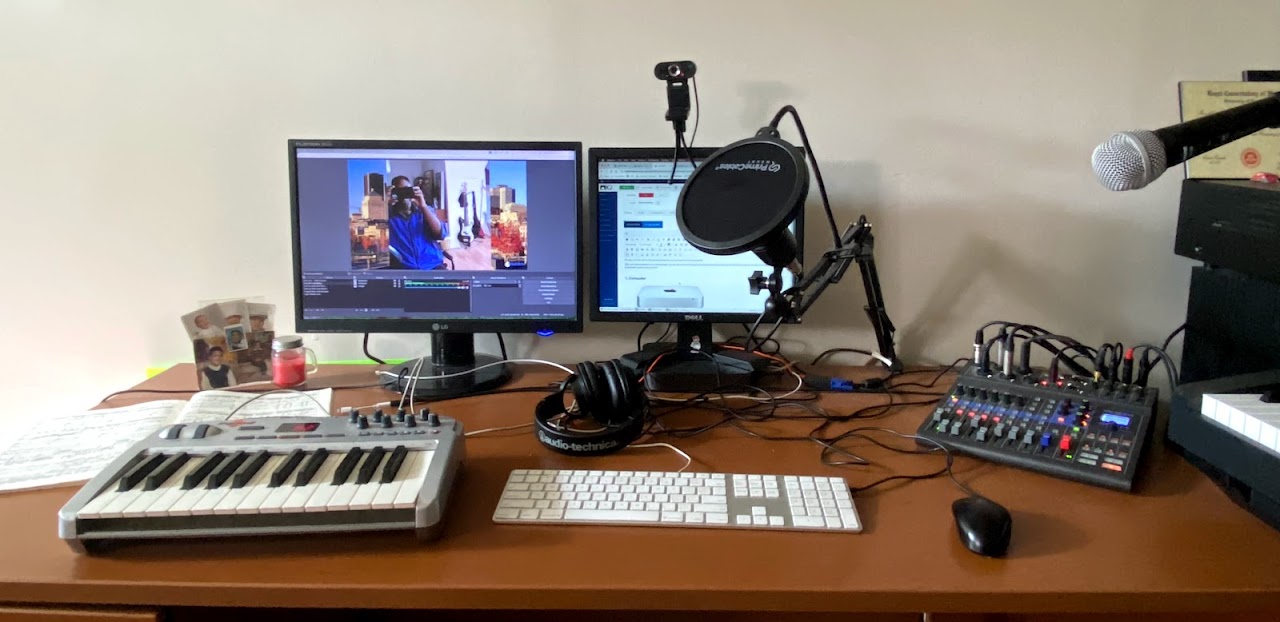
Digital or Acoustic: What Kind of Piano Should You Get
Now that you're interested in taking piano lessons seriously, your next step is choosing a piano that you will bring home to the family!
If you're fortunate, you may already have a piano or keyboard at home. It may not have seen better days, but now that you're taking things seriously it's time to see if you need to do an upgrade or two.
Problem is, there are so many varieties to choose from. It is difficult to know where to start or how much to spend. Then there's the choice between acoustic and digital. Naturally, there are many advantages and disadvantages to both, so I will do my best to list them here. I've had the opportunity to own and use many different kinds of pianos and keyboards, so let my hands be your guide!
Acoustic Pianos
These of course are the traditional kind. There are many varieties and sizes: apartment-size, upright grand, baby grand, concert grand. Now unless you plan on being the next great virtuoso, there are many great apartment-sized pianos you can choose from either new or secondhand.
Advantages
- You get a true stringed instrument with hammer-action keys made of wood and coated with plastic (not ivory).
- You can play music during a power outage.
Disadvantages
- Pianos require tuning at least twice per year in order to keep the tone sounding nice. Stings get to be thrown out of tune with lots of use or heavy play.
- You need to place the piano in an area away from outside walls for proper humidity control. Pianos made of wood will go out of tune if the humidity varies greatly.
- You need to have enough room in your house to place the piano.
- Moving the piano to a different room or house may be costly and cause more detuning.
- Repairs and maintenance are costly.
- High cost of replacement.
Digital Pianos
These have much improved since their inception in the mid 20th century. Digital pianos use an arrangement of sampled sounds from actual pianos to generate the tones you hear when keys are pressed. These are not the same piano sounds generated from a synthesizer. Most inexpensive keyboards offer this lower quality sound such as many in the Casio and Yamaha series of portable keyboards.
Advantages
- Many digital pianos are equipped with a USB/MIDI port for use with connecting to a tablet or computer. This can be used to control software instruments on a tablet or computer to record keystrokes and other electronic music data.
- Can be used in conjunction with a Digital Audio Workstation (DAW) to make multitrack recordings of music with many instruments (keyboard, drums, synthesizer, vocals, etc.)
- Can be moved around with relative ease. Varieties come in the same size as many apartment or baby grand piano styles.
- They do not go out of tune.
- Low cost of replacement,
Disadvantages
- Avoid water at all costs!
- Bad news for you if there's a power failure.
- Lower-quality keyboards have a tendency to break easily.
- Computer connectivity can sometimes be problematic (i.e. driver updates, lack of support, computer hardware issues)
- Motherboards or chips may become defective over time.
Recommendations
Unless you're planning to be a concert pianist, your best bet would be to invest in a good digital piano with weighted hammer-action keys. 88-keys is the standard, however, there are some that come with 76-key and 61-key variations.
The feel is comparable to many good-quality baby grand pianos but without the high price tag and constant maintenance. Roland and Yamaha have good-sounding digital pianos with an excellent feel. They offer full MIDI capability, and when used in conjunction with a DAW such as Logic Pro or Arturia V Piano that come with many fantastic samples of pianos, you will not know the difference and may never look at acoustic pianos the same way.
Getting a piano is a sound investment (no pun intended), and in the end, whether it's an acoustic or digital piano, you win either way as a musician for life!

Subscribe to our newsletter for the latest news and trends in music and digital media.
Our Services
Get in Touch
Digital Media Camps
61 16th Street
Roxboro, Quebec CANADA
H8Y 1P1
1-800-847-7820
TOLL-FREE Canada & USA






